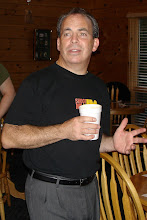Clayton Christensen coined the term "Disruptive Innovation" more than a decade ago to describe the process whereby a new product or service takes root and displaces its established competitors (cell phones disrupting fixed line phones for example). Get it? It's an innovation that disrupts.
However, the process of disruptive innovation has been around for as long as the planet itself. It is a kind of intelligent or human evolution (think speciation). Except with disruptive innovation, we are talking about products or services created by humans.
It is, to say the least, an interesting concept. After all, who doesn't want to create a new product or service that displaces an already popular product or service. Consider the profit potential. There's just one hitch, you can plan disruptive innovation, but you have no way of knowing if it will work. There are just too many random variables that can impact on your plan. On the flip side, the U.S. Patent Office is filled with innovations designed to disrupt and displace, but that never made it beyond the planning stages.
Disruptive innovation references a natural progressive evolution. Take the Internet for example, which has succeeded in disrupting and displacing dozens of products and technologies and changing the world in the process. When Al Gore created the Internet back in the late 1960s, it connected only a handful of computers. At the time, no one envisioned or predicted its eventual impact... anymore than they could have foreseen the popularity of Pet Rocks in the mid-70s or of Beanie Babies in the early 90s.
These are things that happen and that people recognize after the fact.
The idea of building a better mouse trap and having the world beat a path to your door is nearly a century old (See Ralph Waldo Emerson) and alludes to two critical disruptive innovation points:
1. If your mouse trap is better (innovative)...
2. Then there must already be a mouse trap that you are planning to displace (disruptive).
And the assumption is "because your mouse trap is better, the world will embrace it."
Yeah. Tell that to Howard Hughes and his Spruce Goose. Or to Dean Kamen and his Segway. Or to Steven Jobs and his NeXT Computer. Or Bill Gates and his Windows ME software. Despite being among the greatest innovators of the 20th century, they often got it wrong.
So, here it is: Innovation – in and of itself – is a laudable goal and endeavor. And if the innovation happens to disrupt the marketplace, then all the better, as it is obviously something the marketplace has been waiting for.
But if you are expending energy hoping to predict or event create the next disruptive idea (in the words of Pinky and the Brain: to take over the world), you might be better served dropping quarters into a slot machine at the Mirage. The odds of winning are better and the drinks are free.
Yes, Virginia, There Is A Santana Claus
-
I got a call last night around the 6th inning from my good buddy Timmy
Wells. Tim was worried that the Tribe was only up 1-0. He is also worried
that Micha...
10 years ago

No comments:
Post a Comment